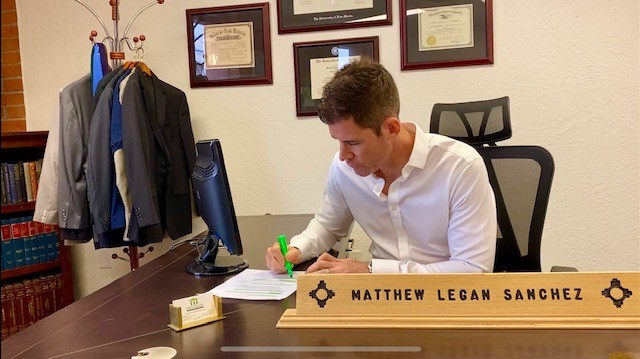
Common custody and visitation issues in Albuquerque
CHILD VISITATION PROBLEMS IN ALBUQUERQUE, NEW MEXICO
Take a moment to envision the classic movie scene where a beloved character is perilously hanging from a cliff and the hand or rope that is preventing them from falling is slowly slipping (*insert dramatic music here*).
Do you have that image in your head? Good.
I begin with this epic movie scene, because some amicable time-sharing agreements are dangling by a thread and are about to crash into court.
Here are ten signs that your amicable time-sharing agreement is deteriorating:
10. Dealing with Child Custody Problems — Poor Communication
Cracks often form in amicable time-sharing agreements through communication issues.
A crack begins in the form of missed texts, or innocuous failures to relay information about the child. The crack can widen over time, turning into rivers of contentious language, passive-aggressive lags in communication, disagreement regarding school and/or extra-curricular activities, and cutting remarks about one’s parenting strategies.
Over time, the cracks can transform into a canyon, leading to insults, arguments regarding appropriate time-sharing, and threats of litigation.
9. Child Custody Issues in New Mexico — Tardy Exchanges and Missed Visits
Late and/or missed exchanges are gateway issues that open the door to increasingly bigger issues. Exchange issues generally begin a domino effect, where one issue leads to the next, eventually crashing into family court.
Exchange issues can lead to communication issues, leading to police involvement, which leads to CYFD/Order of Protections, ultimately culminating in court involvement.
There is a slippery slope with issues that lead to litigation. Often, the best practice is to prevent minor issues, such as tardy/missed exchanges, in order to prevent the spread of issues that lead to litigation.
8. Joint Custody Behavior Problems — Poor School Performance
A child’s behavioral issues are considered to be one of the first signs of home issues. Poor school performance and excessive tardiness/absences are also considered to be an initial sign of problems at home.
Because of this fact, these two issues are generally an ominous sign that an amicable time-sharing agreement might be ending with litigation. This statement is particularly true when the excessive absences/tardiness are primarily occurring in one home, and the co-parent claims that school work is not being completed in the other home.
Similar to the iceberg effect, a child’s behavioral and school issues might be a sign of larger issues that are looming below the surface.
7. Child Visitation Problems — Home Issues
Similar to court orders, amicable time-sharing agreements are not forever forged into stone. Amicable agreements often sour when one parent discovers issues within the other parent’s home.
These home issues generally include: (1) Domestic Violence, (2) Substance Abuse, (3) Co-parent’s leaving the child with caregivers or family members, and (4) Allegations of abuse or neglect.
These issues generally cause the co-parent to believe that the current time-sharing is no longer in the child’s best interests. The court generally becomes involved when the issues rise to such a degree that the parent’s no longer see eye-to-eye and request the court to evaluate the situation and determine the appropriate time-sharing schedule.
6. Shared Child Custody Problems — Substance Abuse and/or Safety Concerns
Requests to change time-sharing are often based upon claims of substance abuse and/or safety concerns. These claims can lead to CYFD involvement, restraining orders (order of protections) that involve the children, or court involvement through the typical Domestic Matters (DM) case.
Judges are treating claims of alcohol abuse with increasing concern. Because judge’s have a “duty to protect the children” they generally error on the side of caution when claims of drug or alcohol abuse are raised. These concerns are heightened when the substance abuse involves domestic violence, unsafe behavior, or a history of arrests.
When one party raises concerns about drug abuse, the assigned judge typically will order for one or both of the parties to take a six month, five panel hair follicle test from an agency such as ABQ Drug Testing.
When one party raises concerns about alcohol abuse, the assigned judge typically will order for the party to complete a PEth test, which is test that can detect levels of abusive drinking, over the course of 21 days. A positive test for either drugs or alcohol abuse can adversely affect one’s custody case.
5. Child Custody Issues and Police involvement
Police involvement is like a dark cloud forming over a parade. Police involvement is a tell-tale sign that the sunny days of amicable time-sharing are coming to an end.
Police involvement may begin with threats to contact the police if the children are not returned, according to the parents’ amicable time-sharing agreement.
The next step of police involvement generally involves “welfare checks,” where the police report to one’s home based on the absent parent contacting the police regarding the child’s welfare or safety.
The final stage of police involvement generally involves situations where the police are called because one parent refuses to follow the amicable agreement. In these situations, the police generally refuse to become involved in the dispute, and will instruct the reporting parent that they do not get involved with “domestic matters” without a court order. In other words, generally the police will only become involved in a domestic dispute that involves custody or time-sharing when there is a valid court order regarding time-sharing.
4. Child Visitation Issues and CYFD Involvement
CYFD involvement tends to evolve from the home issues discussed above. Home issues, police involvement, and CYFD generally go hand-in-hand and follow a “domino effect” leading to court involvement.
CYFD involvement generally beings with allegations of abuse or neglect. Depending on the severity of the allegations, CYFD may initiate Abuse and Neglect investigations. In severe cases, the child may be taken from the family and placed in CYFD’s custody for 48 hours. In other cases, CYFD may enter a temporary “Safety Plan” after meeting with the parents. The Safety Plan generally determines custody and time-sharing issues until the matter can be addressed by a DM court. Once the investigation is complete, CYFD generally provides a Notice of Results of Investigation. This Notice informs the parents whether CYFD has substantiated (i.e. confirmed) or unsubstantiated (i.e. denied) the allegations of abuse or neglect.
Substantiated claims of abuse or neglect can have an immense, adverse effect in the parents’ DM matter, where the assigned Judge is tasked with determining the “best interests of the child.”
3. Parental Custody Issues — Order of Protections
CYFD involvement is a generally a sign that a Petition for Order of Protection is near. Parents can file a Petition for Order of Protection, on a child’s behalf, regarding an alleged act of abuse.
The DV Court that handles Order of Protections generally leans on the side of caution and will enter a Temporary Order. This Temporary Order generally grants one parent temporary, sole legal custody until a hearing is set. By statute this hearing must take place within 10 days, but is often extended for “good cause shown.”
At this hearing, the parties’ present evidence to a Special Commissioner, who decides, based on the “preponderance of the evidence standard,” if an act of abuse occurred. Basically, “preponderance of the evidence” means “does the Special Commissioner believe that it is more likely than not that an act of abuse occurred.” In many instances, whether or not a permanent order of protection is entered boils down to whom the Special Commissioner finds to be more credible (i.e. who the Commissioner believes more).
Generally speaking, the Special Commissioner will find that an act of abuse occurred, in situations where CYFD is involved and has substantiated claims of abuse. In situations where an Order of Protection is entered, the DV court then has six months of jurisdiction to determine custody and time-sharing issues. This six month window generally gives the parties sufficient time to file the necessary Petition to Establish Paternity, Custody and Time-sharing, which results in the DM Court addressing the child’s best interests and entering a long-term time-sharing order.
2. Custody Problems and Lawyer Talk
Lawyers have their own lingo – and when you hear it a lawyer is probably nearby. Here are some classic phrases that you’ll probably hear when litigation is looming:
A. Best interests of the child
This is the gold standard, number one lawyer phrase that you will hear when amicable time-sharing agreements are falling apart. The “best interests of the child” standard is the North Star that guides all child custody cases. Ultimately your assigned judge will determine the “best interests of the child” in relation to the appropriate time-sharing.
In essence, by using the phrase “best interests of the child,” your ex is conveying that the current time-sharing arrangement is not working, and for any number of potential reasons, the DM court should determine the appropriate system of time-sharing.
B. Status Quo Time-sharing
This is a major buzz word/phrase in family law. This phrase essentially means that DM courts generally prefer to continue a child’s time-sharing schedule since separation, because children thrive with consistent, predictable, and stable time-sharing.
Normal people usually don’t throw around phrases like “status quo time-sharing.” So when you hear this phrase, a lawyer is probably close.
C. Material Change in Circumstances
People tend to believe that custody, time-sharing and child support orders are permanent – meaning that they last forever. In family law, the word permanent is illusory and any order can be modified based on a material change in circumstances.
Child Support can be modified if application of the Guidelines (i.e. a change occurs with any of the child support factors) resulting in a 20% increase/decrease to one’s monthly obligation. This 20% increase/decrease is considered a “material change in circumstances” that warrants a change in support.
Regarding custody and time-sharing, examples of what generally constitutes a material change in circumstances include: (1) parental remarriage, (2) change in the child’s school, (3) substantial change to a parent’s work schedule, (4) disability, illness, substance abuse, or any other issue that directly affects the parents’ ability to care for the child, (5) relocation, (6) subsequent divorce, (7) remarriage, (8) abuse or neglect, and (9) developmental changes affecting the child.
When you hear the phrase “material change in circumstances,” you’re basically hearing your ex say that the current situation needs to change, and that a judge needs to determine the appropriate time-sharing based on the “best interests of the child.”
D. Child Support Guidelines
Child support in New Mexico is based on statutory guidelines that provide consistent and predictable results.
Child support is based on a number of factors, including: (1) Each parent’s time with the child, (2) Each parent’s gross monthly income, (3) Work-related daycare expenses, (4) Insurance premiums paid for the child, certain (5) Extraordinary expenses, and (6) Travel expenses.
If you suddenly hear the phrase, “Child Support Guidelines,” there’s a possibility that litigation is blooming on the horizon.
1. You’re Searching For a Child Custody Lawyer in Albuquerque
The fact that you’re reading this blog is a solid indication that you have a sixth sense that your amicable time-sharing is collapsing.
Possibly your unique situation doesn’t fit into the “one size fits all” factors listed above. Potentially one, or a combination of the factors that are listed above, hit close to home and resonate with your unique situation.
In other situations, your ex might be uncharacteristically quiet and you have a spooky feeling that you’re experiencing the quiet before a storm of litigation. For whatever reason your gut instincts are telling you that something isn’t right and you’re searching for legal information.
The steps that you take from this point forward can greatly impact your case and long term time-sharing.
If you still have questions about your unique situation, it is imperative to speak with an experienced attorney that can provide sound legal advice that is based on extensive courtroom experience. Incidentally, Matthew Legan Sanchez is such an attorney and can be contacted by calling (505) SANCHEZ.
(505) SANCHEZ IS HERE TO ANSWER ALL OF YOUR VISITATION AND TIME-SHARING QUESTIONS
Do you still have questions regarding custody or time-sharing in Albuquerque, New Mexico? Custody cases often require the experience hand and knowledge that comes with years of courtroom practice. Matthew Legan Sanchez is an experienced Albuquerque child custody attorney. Sanchez can be reached by calling (505) SANCHEZ.

What is an amicable parenting agreement?







